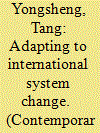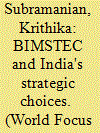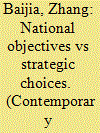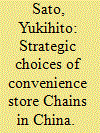| Srl | Item |
| 1 |
ID:
133845


|
|
|
|
|
| Publication |
2014.
|
| Summary/Abstract |
Understanding the transition happening in the international system requires a balance between old logic and new reality. As the power pattern changes and the characteristics of international order unfold, the complications of global politics, casual relationships among different issues, and the echoing effects of strategic choices will lead to greater need for global governance. The logic of simple power politics will not be enough when strategists confront nontraditional challenges.
|
|
|
|
|
|
|
|
|
|
|
|
|
|
|
|
| 2 |
ID:
167274


|
|
|
| 3 |
ID:
101107


|
|
|
| 4 |
ID:
087427


|
|
|
|
|
| Publication |
2009.
|
| Summary/Abstract |
Two large Japanese convenience store chain companies, namely 7-Eleven Japan and FamilyMart, both of which set up businesses in China in 2004, have followed entirely different strategies. FamilyMart chose a team management strategy which is distinguished by fully utilizing the resources of its Taiwanese subsidiary and forming a partnership with a big Taiwanese business group, Ting Hsin International Group in China. By contrast, 7-Eleven Japan built up its China subsidiary almost wholly by itself, a policy that can be described as a managing-alone strategy. The differences in strategy stem fundamentally from differences in the two companies' experience of international management and from the knowledge derived from that experience. And their choice of strategies has also been shaped by the interactions between two Taiwanese business groups, namely the Ting Hsin International Group and the President Group. Furthermore, we find that FamilyMart's strategy enabled it to build up its operations more quickly than the policy adopted by 7-Eleven Japan. Although the latter's strategy is more time-consuming, it offers a stronger possibility of establishing a more efficient and more transparent business model than the approaches followed by other convenience store chains.
|
|
|
|
|
|
|
|
|
|
|
|
|
|
|
|